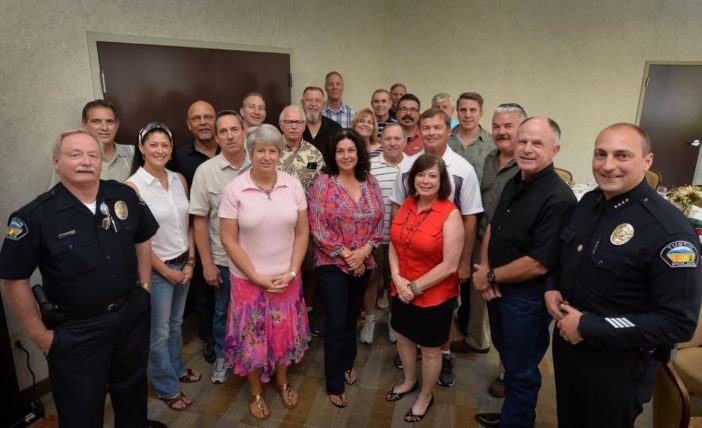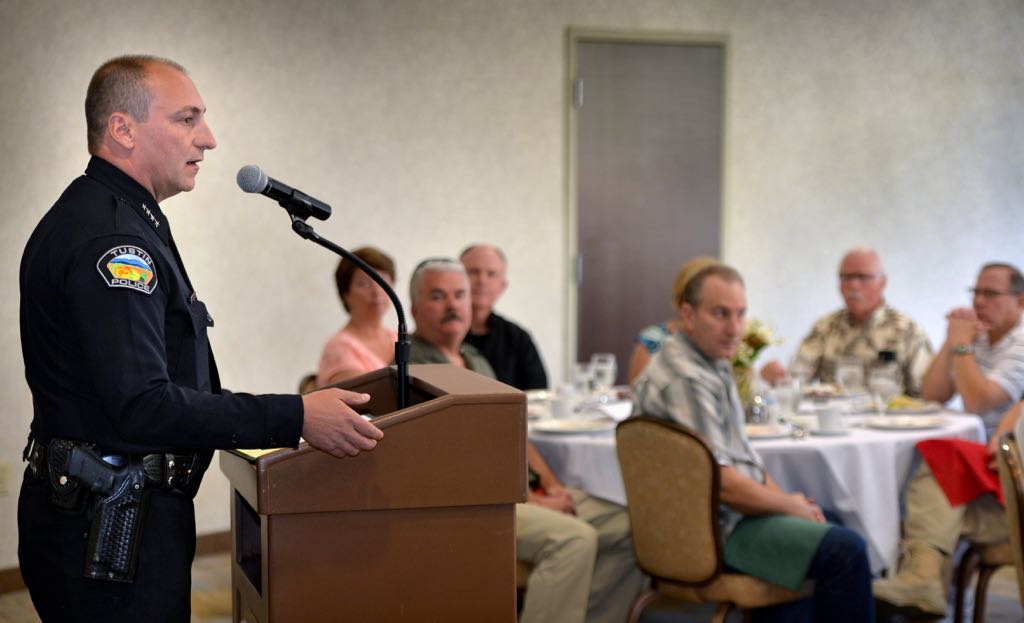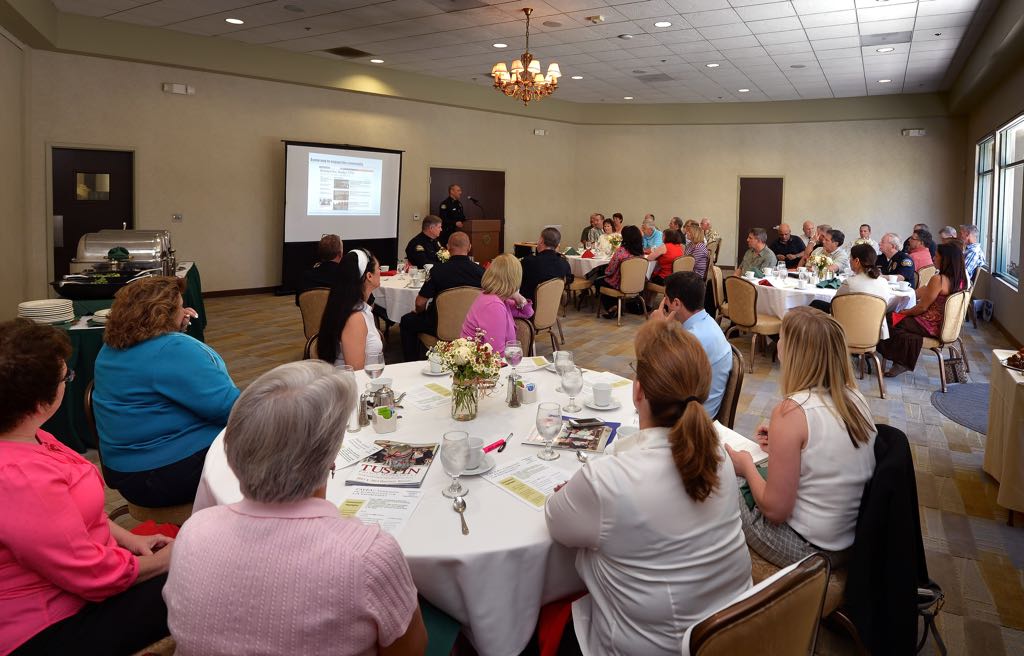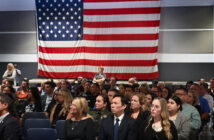Tustin Police Chief Charles Celano vividly remembers his first day on the job 24 years ago.
More experienced patrol officers welcomed him to briefing and encouraged him pull up a chair in the back row.
“Hey kid, sit here,” one officer said, pointing to the seat.
Moments later, Officer Barney LaBarge slammed his D-Cell flashlight on the table, startling Celano.
“Kid, you’re in my seat,” LaBarge said.
A wide-eyed Celano quickly moved only to be cajoled by another veteran sergeant.
“Hey kid, when were you born?” Bill Fisher asked.
“In 1970, sir,” Celano said.
“I’ve been in this job for longer than you’ve been alive,” Fisher scoffed.
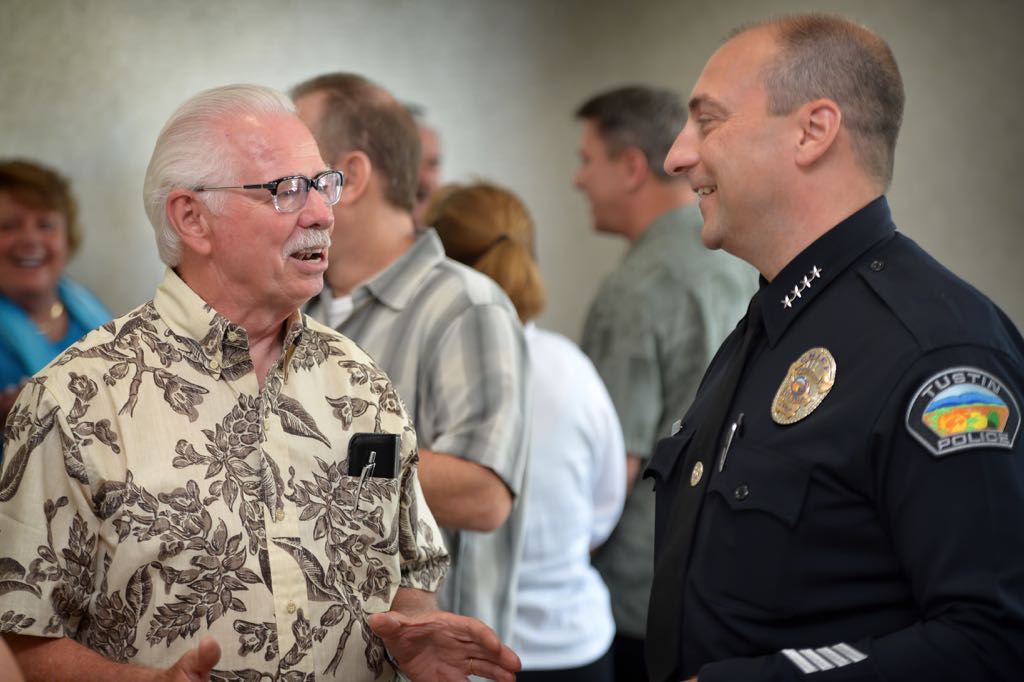
Tustin Police Chief Charles Celano, right, talks to retired Sgt. Bill Fisher during the department’s retiree luncheon at the Tustin Ranch Golf Club.
Photo by Steven Georges/Behind the Badge OC
Celano recounted this anecdote in front of about 40 Tustin PD retirees, including LaBarge and Fisher, at a lunch April 28 at the Tustin Ranch Golf Club.
The tale was met with laughter, with many in the room nodding their heads likely remembering how rousing the rookies just a bit was part of the fun.
The luncheon is a tradition, started five years ago, to keep those who have served the community in touch, including long-time retirees, the newly retired and some current employees.
“For me, reconnecting reminds you of why you did what you did for 25 years,” said Laura Ulrich a dispatcher who retired last year. “There’s a very unique bond between dispatchers and officers when you work some of these things together.”
“It’s nice to come here and refresh that bond.”
Honoring the relationships those in law enforcement have built over the years was a common theme at the luncheon.
“This career, the time you spend here, it’s about the people,” Celano said. “It’s important to honor our past. We talk a lot about the future, but the past is where we came from.
“All of you really built the framework for where we are today.”

Tustin Police Department’s retiree luncheon at the Tustin Ranch Golf Club.
Photo by Steven Georges/Behind the Badge OC
Where Tustin PD is today has drastically changed from when many in the room started their careers.
When Fisher started with Tustin, the academy wasn’t a prerequisite to patrol the streets and all communications to dispatch had to come from the patrol car.
Advances in forensic science and technology, including body cameras, which Tustin is planning to incorporate by the end of the year, are changing the way officers do their jobs.
“Body cameras are a benefit that a lot of people don’t understand yet,” Fisher said. “I remember when they introduced dash cams and officers were wary of those … but they reduced complaints.
“Everything here in Tustin seems to be for the better. The department is growing; it’s evolving.”
While new gear and technology makes officers’ jobs easier tactically, public perception of the profession makes for a challenging social climate.
“I enjoyed the career and I still miss the career and the interaction with the public,” Fisher said. “But the way the public is viewing us, I’m glad I’m retired.”
Events like the Michael Brown shooting in Ferguson or the death of Freddie Gray in Baltimore have widespread effects on agencies across the nation, including Tustin.
What’s happening Baltimore is impacting every law enforcement agency in the nation, as we are typically all painted with the same broad brush. It makes the job of our patrol officers all the more difficult.
Tustin Police combat widespread misconceptions by maintaining transparency and continuing their work in the community with events such as open houses, holiday outings and Coffee with a Cop, among others.
“Community relations has never been more important in our industry,” Celano said.
 Behind the Badge
Behind the Badge
